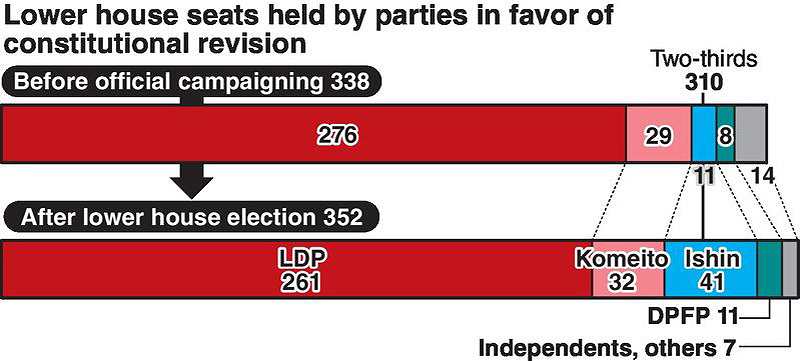
November 4, 2021
Seventy-five years have passed since the promulgation of the Constitution of Japan on Nov. 3, 1946.
Following the recent House of Representatives election, parties largely in favor of constitutional revision — comprising the Liberal Democratic Party, Komeito, Nippon Ishin no Kai (Japan Innovation Party) and the Democratic Party for the People (DPFP) — occupy 352 seats, over three-quarters of the lower house.
Attention will be focused on whether the administration of Prime Minister Fumio Kishida will make progress in debates on constitutional revision, with lawmakers in favor of maintaining the minimum two-thirds majority required to initiate a constitutional amendment in both houses of the Diet.
Before the election, parties in favor of revision held a total of 338 seats, exceeding the two-thirds (or 310 seats) minimum, comprising lawmakers of the LDP and Komeito ruling coalition, as well as those in Ishin, DPFP and some independents.
The increase in support for constitutional revision is largely due to the electoral gains made by Ishin, which went from 11 seats in the lower house to 41.
At a press conference on Monday, LDP leader Kishida said he would “vigorously work to achieve the party platform of revising the Constitution.”
During his term as LDP president, which runs through September 2024, Kishida wants to realize four points that comprise the party’s ideas on constitutional revision, including specifying the grounds for the Self-Defense Forces and creating an emergency clause.
Constitutional amendment requires a two-thirds majority in both houses of the Diet, followed by a majority vote in a national referendum.
“There is still room to broaden people’s understanding [regarding constitutional revision]. By advancing understanding in the Diet and among the people, we would like to bring about results,” Kishida said at the press conference.
A revised law on national referendums that makes it easier to hold plebiscites on constitutional revision was enacted in June during the ordinary Diet session, three years after it was submitted to the Diet.
Although the environment for a national referendum has been improved, there is a gap among the constitutional reform forces over specific amendment items. Komeito wants to add provisions to the Constitution but does not support specifying the legal grounds for the SDF and creating an emergency clause.
Some Komeito lawmakers are calling for Diet functions to be reinforced in preparation for another spike in coronavirus cases. But with an upper house election slated for next summer, other members have called for the party to focus on securing a victory instead of aiming for constitutional revision, which could exhaust the strength of the administration.
The Constitutional Democratic Party of Japan (CDPJ) made no mention of the top law in its campaign platform during the lower house election, but in policy documents released at the same time, it said it would “promote discussions on the Constitution from the perspective of further developing and thoroughly implementing constitutionalism.”
Following the announcement of the resignation of CDPJ leader Yukio Edano, who was cautious regarding constitutional reform, some in the LDP are hoping for a change in the stance of the largest opposition party.
Survey: 79% support revision
Among newly elected lower house members, 455, or 98%, had responded to a Yomiuri Shimbun survey during the campaign, with 79% saying they were in favor of constitutional revision.
In contrast to LDP lawmakers, most of whom support revision, those from Komeito were cautious about amending the top law. Meanwhile, among opposition parties, positive attitudes on constitutional revision were prominent among Ishin and DPFP lawmakers.
Among LDP-affiliated lawmakers, 97% were in favor of revision, but among the lawmakers affiliated with Komeito, the junior coalition partner of the LDP, about 60% were in favor and more than 30% were against.
In a similar survey conducted during the lower house election in 2017, 90% of Komeito-affiliated lawmakers were in favor of revision.
Among opposition parties, all Ishin- and DPFP-affiliated lawmakers supported constitutional revision in the latest survey.
Meanwhile, 55% of CDPJ-affiliated lawmakers were against it, compared with 36% in favor, and all Japanese Communist Party-affiliated lawmakers were against revision.
When the respondents in favor of constitutional revision were asked to specify amendment items, with multiple answers accepted, the most common response at 51% was “creation of an emergency clause,” which was cited by 82% of LDP-affiliated lawmakers and about 30% of Ishin- and DPFP-affiliated lawmakers.
As a result of the COVID-19 pandemic, there seems to be growing recognition that constitutional revisions are necessary to provide the legal grounds for government powers to limit rights in times of emergency.
Top Articles in Politics
-

Japan PM Takaichi’s Cabinet Resigns en Masse
-

Sanae Takaichi Elected 105th Prime Minister of Japan; Keeps All Cabinet Appointees from Previous Term
-

Japan’s Govt to Submit Road Map for Growth Strategy in March, PM Takaichi to Announce in Upcoming Policy Speech
-

LDP Wins Historic Landslide Victory
-

LDP Wins Landslide Victory, Secures Single-party Majority; Ruling Coalition with JIP Poised to Secure Over 300 seats (UPDATE 1)
JN ACCESS RANKING
-

Japan PM Takaichi’s Cabinet Resigns en Masse
-

Japan Institute to Use Domestic Commercial Optical Lattice Clock to Set Japan Standard Time
-

Israeli Ambassador to Japan Speaks about Japan’s Role in the Reconstruction of Gaza
-

Man Infected with Measles Reportedly Dined at Restaurant in Tokyo Station
-

Man Infected with Measles May Have Come in Contact with Many People in Tokyo, Went to Store, Restaurant Around When Symptoms Emerged



















